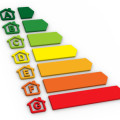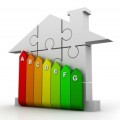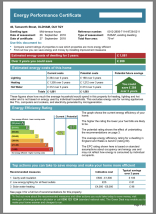
What is a Energy Performance Certificate EPC Inspection - October 2020
A dip.DEA who is an Accredited Energy Assessor visits the property to collect data required for assessing the energy elements of the property and provides an Energy Performance certificate (EPC) using Government approved software. The Assessment is based on the construction and type of dwelling and relevent fittings (Insulation levels & type, heating systems or double glazing) It is not a structural or building survey, condition report or property valuation. An EPC should not be read as a comment on the overall condition of the property nor will it comment on the presence or otherwise of asbestos, high alumina cement concrete, additives including calcium chloride, or any building defects or hazardous materials.It will also not cover items or problems in the property which would be picked up in a building survey, which may be costly to rectify, as these are outside the scope of the data collected.
Why are the potential Heating costs greater than the current heating costs when the EPC recommends low energy lighting is installed ?
This occurs when low energy lights are recommended and there is no recommendation for improvements to the heating system (usually because an efficient heating system is already installed). Standard light bulbs generate more heat than low energy light bulbs, by replacing standard bulbs with low energy bulbs the heat generated by the lighting is reduced and the heating system has to make up the difference. The reduction in the lighting cost is far greater than the increase in the heating cost, so this means overall there is a net reduction in energy costs for the property.
In the first instance contact the energy assessor, whose details are on page 2 of the report. If that does not resolve the issue contact the approved organisation given at the top of the EPC. You can also find contact details for all approved EPC organisations
How do I check the EPC is valid ?
Go to www.epcregister.com and click the link to access the Domestic EPC Registers. Click on ‘Report Retrieval’ and follow the instructions on the screen.
The costs shown on the EPC are higher than my actual energy bills for the year, why is this?
EPCs use standardised
assumptions so as to make properties directly comparable while still reflecting the features of individual properties. The EPC costs are based on a number of assumptions: a standardised heating
pattern, standard number of occupants, standard hot water usage and average weather conditions. If you actually use less hot water than the EPC assumes (for example), then your bills will be lower
than the EPC estimates.
Why are the energy costs shown on the second page of my EPC lower than my energy bills?
Standard occupancy,
heating patterns and hot water use are assumed when working out the EPC, to ensure the EPCs for different homes can be compared by prospective buyers or tenants. The EPC costs account for energy used
for heating, lighting and hot water, but do not include other energy uses in a property, for example cooking or the number of electrical appliances. An EPC is calculated based on standard occupancy
rather than how an individual uses the property and appliance use can vary significantly between users.
Surely my house is better than indicated in the report?
The EPC gives information
on the current and potential energy performance of the property. It does not cover its current condition or decorative state.
My house has a low rating but there are no improvement options - why not?
The potential ratings are
based on the adoption of cost-effective improvements. It might be that only more advanced and so, more costly improvements are identified for your property; if that is the case, these are indicated
towards the end of the report under "Further measures".
I have added insulation to my house, but the SAP rating is low and the insulation is not shown on the EPC, why is this?
The RdSAP survey is a non-invasive survey and for insulation to be included in the assessment there must be evidence that the insulation has been added. This evidence can be either visual or documentary evidence of specific works relating to the property being assessed. This means that if insulation has been added but there is no access for the energy assessor to inspect it nor documentary evidence that the work has been done, it cannot be included. In these cases the level of insulation is assumed from the age of the relevant part of the dwelling.
This applies to roof
insulation, floor insulation and wall insulation.
What does the summary of this home's energy performance related features show?
On page 3 of the Energy Performance Certificate there is a summary of the dwelling's energy performance. Each element (walls, roofs, heating system, etc.) of the dwelling has been given an assessment of the current energy efficiency and environmental performance. The assessment is based on a scale of 1 to 5 stars with 1 star being very poor and 5 stars being very good. The performance is assessed by the software on the basis of age of property, construction type and features.
This relates to performance, not appearance. It does not take into account the physical condition or quality of the element.
An ‘indicative’ cost is shown for the recommendations on page 4 of my EPC; what does this mean?
The indicative cost of recommendations are those that apply to a typical property. They may differ for very small or very large properties or ones with special features. The cost data are compiled by the Energy Saving Trust from various sources including EST's Housing Model and Low Carbon Building Programme Analysis.
The EPC says that the performance rating is only 1 or 2, what does this mean?
The "Current performance - Energy Efficiency" section of the summary for your dwelling, shows how much the element contributes to the fuel costs of the dwelling. If an element has an energy efficiency performance of 1 or 2 stars, then this means that it results in higher than average fuel costs for the dwelling.
The "Current performance - Environmental" section of the summary shows how much the element contributes to emissions of the greenhouse gas carbon dioxide (CO2.) An element has an environmental performance of 1 or 2 stars if it causes relatively more CO2 to be produced than average.
This relates to performance, not appearance. It does not take into account the physical condition or quality of the element. It is an indication of how much more (or how much less) the home will cost to run and contribute to CO2 emissions.
I have what I believe to be a highly efficient LPG/oil heating system in my property. However on page 3 of my EPC the 'Main Heating' has an 'energy efficiency' of only 2 or 3 stars - why is this?
The current performance
of the 'main heating' in the 'efficiency' column in the table on page 3 of the EPC is related to the cost of running the heating system. This takes into account the price of the fuel used and the
efficiency of the heating appliances. Mains gas is a relatively cheap fuel; oil is significantly more expensive and LPG (Liquified Petroleum Gas) is even more expensive.
Therefore, if a home has a mains gas boiler it will cost less to run than an oil or LPG boiler of the same efficiency.
The "Energy Efficiency" column in the table on page 3 of EPC informs the consumer about their heating system purely from a cost perspective. The descriptions in the column therefore change depending on the fuel used and the efficiency of the heating system. For example, a gas condensing boiler will have 4 or 5 stars whereas an oil boiler of the same efficiency will have 3 and an LPG boiler of the same efficiency will have 2.
I have a very modern electric heating system in my home. However, on page 3 of my EPC the 'Main Heating' has an 'energy efficiency' rating of only 1 star - why is this?
The current performance
of the 'main heating' in the Energy Efficiency column in the table on page 3 of the EPC is related to the cost of running the heating system. This takes into account the price of the fuel used (per
kWh) and the efficiency of the heating system. Electricity is significantly more expensive than mains gas. Currently, mains gas is one of the cheapest forms of fuel.
For example, if a home has a mains gas boiler it will cost less to run than an electric boiler or electric storage heaters. The Energy Efficiency column in the table on page 3 of the EPC therefore
informs the consumer about their heating system purely from a cost perspective. The descriptions in the table will therefore change depending on the fuel used and the efficiency of the heating
system.
Even though an electric heating system may be 100% efficient at the point of use, turning all the electricity used into useful heat, it will still be more expensive for a home owner to run than a 65% efficient mains gas boiler. A gas boiler will have heat losses associated in converting the burning fuel into useful heat for the property, but these losses are outweighed by the lower cost of mains gas.
I have a programmer and a thermostat on my boiler but on page 3 of the EPC, the 'Main Heating Controls' have an 'energy efficiency' rating of only 1 or 2 stars - how can this be?
Current building regulations require a boiler to be fitted with a 7-day programmer for space heating and hot water and either a room thermostat or thermostatic radiator valves (TRVs) on radiators within each room. A home with these would have a better rating in the table on page 3 of the EPC than 1 or 2 stars; which apply to a property that does not have these controls. A thermostat on the boiler is not the same as a room thermostat, which is normally located in the hall or living room.
A property with a programmer allows an occupant to control the times the heating is in operation.
A thermostat sited on the
boiler itself only controls the flow temperature of the water leaving the boiler and is a less efficient way of controlling room temperature than a room thermostat. A room thermostat located on an
internal wall within the property allows occupants to set the temperature within the property, and will produce better comfort levels for occupants than a boiler thermostat.
TRVs allow occupants to set different temperatures in different rooms, thus further improving comfort levels within the dwelling.
The addition of both a room thermostat and TRVs will improve the current performance rating of the 'Main heating controls' on page 3 of the EPC. There are also other more sophisticated forms of
heating controls, such as zone control and a boiler energy manager.
A property is heated by conventional electric heaters and the EPC recommends the installation of storage heaters. The resultant change makes the Environmental Impact Rating worse rather than better, why is this?
Storage heaters are recommended as they are cheaper to run, making use of low-rate night-time electricity. However the total amount of electricity used by a storage heater system is greater than that used by conventional panel heaters. Therefore the resultant Energy Efficiency Rating is improved as running costs are reduced but the Environmental Impact Rating is made slightly worse as the total amount of energy used increases.
My recent EPC makes the recommendation of changing my current boiler to a new condensing boiler, but I have only recently had my boiler changed, why is this?
The EPC is looking at the potential energy performance of the property and in this case has identified that the current boiler is not the most efficient boiler available. The recommendation to improve the boiler to a more energy efficient boiler is made purely on the energy efficiency rating of the boiler and does not take into account the age or condition of the currently installed boiler. So if your recently installed boiler is band B for efficiency, the EPC is recommending that a band A boiler is more efficient. This recommendation identifies that there are more efficient boilers available and that a homeowner should consider this when they next have to replace the boiler.
My EPC lists a number of recommendations that seem inappropriate as they recommend changing items that I have recently updated, renovated or had replaced
An EPC is purely concerned with identifying the current and potential energy performance of a property. The EPC assessment does not look at the age or physical condition of any of the elements assessed but rather the energy efficiency.




